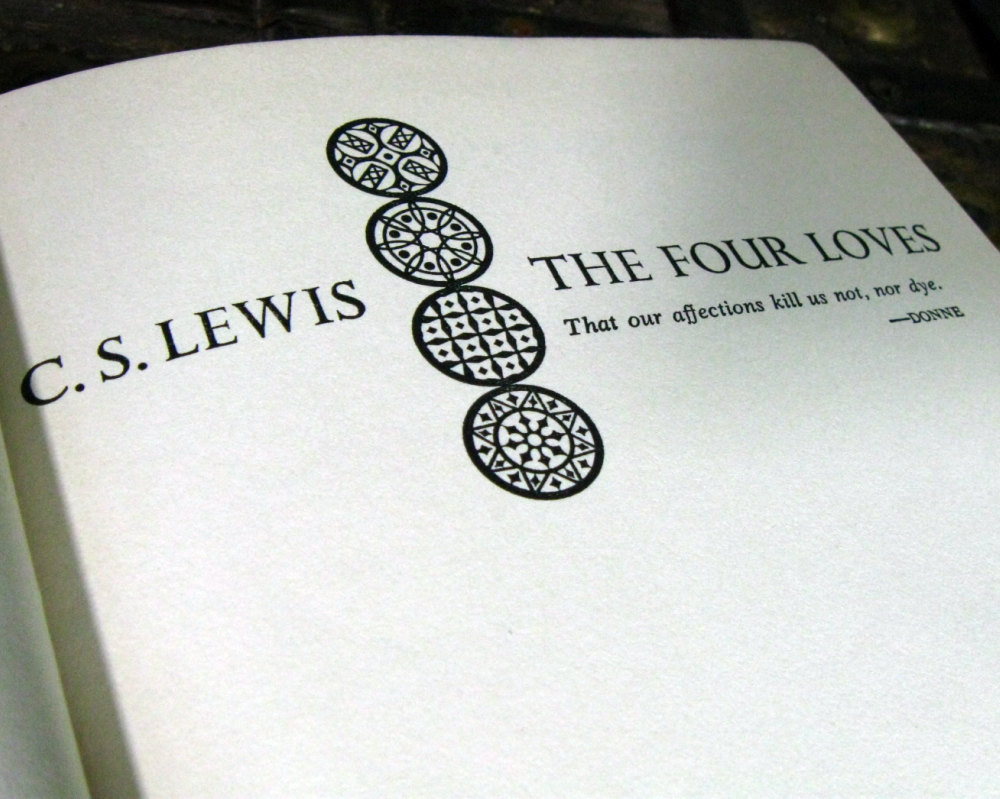Re-reading any work by C. S. Lewis is hardly a waste of one’s time. I go back continually to what he has written because I keep finding new treasures, even in passages that I already know to some extent. For instance, in The Four Loves, there is a part that is often quoted—I have quoted it—yet I forgot the context in which Lewis penned it.

It’s in the final chapter, the one on “Charity.” The greater context is the concern that we may love a person more than we love God. Lewis refers to a comment by St. Augustine who, after the death of a close friend, warned Christians not to give their heart to anything but God. “All human beings pass away,” Lewis paraphrases Augustine. “Do not let your happiness depend on something you may lose. If love is to be a blessing, not a misery, it must be for the only Beloved who will never pass away.”
Lewis agrees that this is entirely sensible. After all, no one on this earth and nothing that we strive for can possibly be equal to God. “Don’t put your goods in a leaky vessel,” he says. “Don’t spend too much on a house you may be turned out of.” Why does this have an appeal? Well, we are “safety-first” creatures. We try to avoid anything that will lead to suffering.
Yet, Lewis recalls, didn’t Jesus weep over the coming fate of unfaithful Jerusalem and at the tomb of Lazarus? Didn’t the apostle Paul say that if his friend and co-laborer for the Gospel, Epaphroditus, had died, he would have suffered “sorrow upon sorrow”? Neither Jesus nor Paul avoided the close human relationships that had the potential for suffering.
Then comes the oft-quoted passage that certainly deserves to be oft-quoted:
There is no safe investment. To love at all is to be vulnerable. Love anything, and your heart will certainly be wrung and possibly be broken. If you want to make sure of keeping it intact, you must give your heart to no one, not even to an animal.
Wrap it carefully round with hobbies and little luxuries; avoid all entanglements; lock it up safe in the casket or coffin of your selfishness.
But in that casket—safe, dark, motionless, airless—it will change. It will not be broken; it will become unbreakable, impenetrable, irredeemable.
The alternative to tragedy, or at least to the risk of tragedy, is damnation. The only place outside Heaven where you can be perfectly safe from all the dangers and perturbations of love is Hell.

Lewis then offers this piece of wisdom: “We shall draw nearer to God, not by trying to avoid the sufferings inherent in all loves, but by accepting them and offering them to Him; throwing away all defensive armour.” Submission to the Lord of love is the key. “If our hearts need to be broken, and if He chooses this as the way in which they should break, so be it.” Shortly after writing these words, Lewis suffered the heartbreak of the death of Joy, his wife. He was tested to follow his own wisdom, and he came out on the other side with his faith intact.
His conclusion with respect to the danger of loving others more than God?
It remains certainly true that all natural loves can be inordinate. Inordinate does not mean “insufficiently cautious.” Nor does it mean “too big.” It is not a quantitative term. It is probably impossible to love any human being simply “too much.”
We may love him too much in proportion to our love for God; but it is the smallness of our love for God, not the greatness of our love for the man, that constitutes the inordinacy.
So, don’t draw back from loving others. Jesus gave us the model for that love. It’s a love that is willing to lay down one’s life for another.
